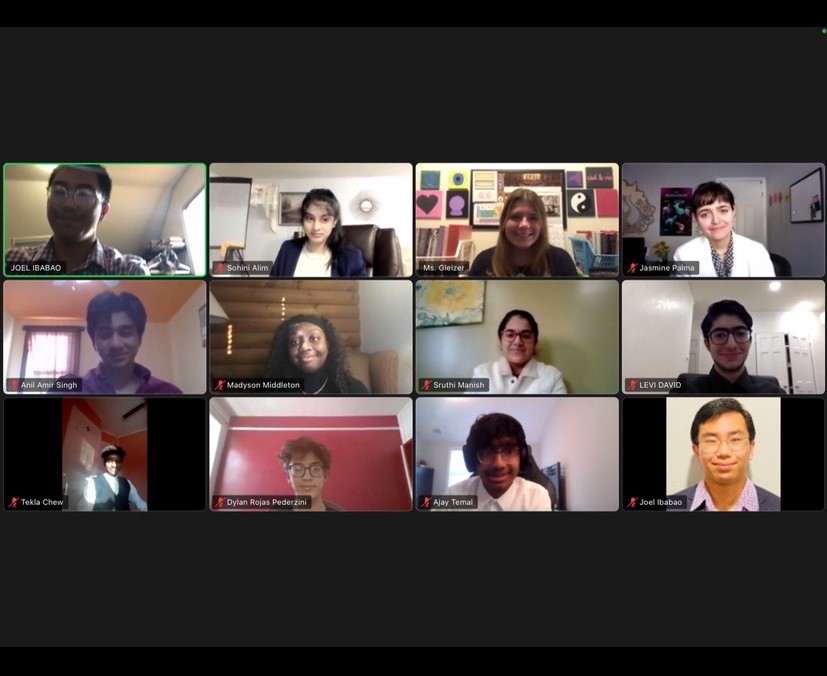
In early February, the Townsend Harris Ethics Bowl teams competed in the NYC Regional Ethics Bowl, and secured a win against 38 teams from 16 high schools in New York and New Jersey. Although both competing teams (designated Teams 1 and 2) worked strenuously to prepare, Team 1 will be advancing to represent NJ and NY at Nationals.
The Ethics Bowl is an academic competition where students discuss real-life issues and analyze ethical dilemmas. Competitors develop arguments and decide on a justified course of action for moral cases. According to the National High School Ethics Bowl, “An ethics bowl differs from a debate competition in that students are not assigned opposing views; rather, they defend whichever position they think is correct, provide each other with constructive criticism, and win by demonstrating that they have thought rigorously and systematically about the cases and engaged respectfully and supportively with all participants.”
Though participating in the Ethics Bowl at Townsend Harris is an extension of the Philosophy Club, competitors do not have to be club members. The Philosophy Club first participated in the Ethics Bowl last year when the leaders of the club at the time, Inga Kulma, Javah Xie, and Sarah Levi organized two teams to represent the school, both of which did not qualify for the semifinals of the competition. This year, Team 1 was composed of juniors Joel Ibabao, Sruthi Manish, Jasmine Palma, and seniors Anil Singh, and Sohini Alim. Team 2 was composed of freshman Madyson Middleton, sophomores Ajay Temal, Dylan Rojas Pederzini, Tekla Chew, and junior David Levi.
To prepare for the Ethics Bowl, the competitors practiced using sample cases provided by the organization. “Fifteen cases are released in advance for teams to formulate an argument under some sort of philosophical framework with accompanying evidence for support,” said Jasmine, who is also a Science and Technology Editor for The Classic. “It’s essentially an ultra-organized ethical socratic seminar.”
“For cold cases, we talked about digital black face, the ethicality of using a Nazi medical book to save a patient’s life, the obligation we hold to our parents and loved ones when it goes against our own interests, and performative activism and how corporations should engage in civil movements,” she added.
Following their victory, the competitors reflected on their initial motivation to compete in the Ethics Bowl.
Current Philosophy Club president Joel said that for many participants, it is the challenge of forming powerful, rationally consistent arguments by using normative ethical theories like utilitarianism, deontology (Kantianism), feminist care ethics, and virtue ethics, while still maintaining respectful discourse. “When presenting, we hold on to these frameworks for dear life and sometimes combine them, depending on their varying applicability to the case at hand,” Joel said.
“It’s special because the goal of each match and the competition as a whole really isn’t to defeat your opponents as much as it is to have a really fascinating discussion with them,” Dylan said.
Similarly, Philosophy Club vice president Tekla said, “This activity seems special because it not only encourages you to explain and debate your opinions, but it forces you to view issues from a moral and philosophical framework which normally leads to very deep and meaningful conversations about meaningful issues.”
“I saw [the Ethics Bowl] as an opportunity for me to engage in philosophical discussions about pertinent issues without having to be in the Philosophy Club,” Jasmine said. “There’s no other activity at THHS that encapsulates the scientific element at the crux of much of humanities like the Ethics Bowl, and by extension, the Philosophy Club.”
The competitors expressed their pride at having surpassed their expectations. Joel said, “We were all taken aback with this victory, which seemed miraculous and surreal even a little after we won the final round 3-0…Overall, I am exceedingly proud of both teams and I cannot wait for April to come!”
Ms. Gleizer, advisor of the Philosophy Club, thought that the virtual setting of this year’s competition presented a new set of challenges that had to be taken into account while preparing. “In person the students can read the room a little easier and can communicate with each other using nonverbal cues, such as eye contact, to work together during the presentation time. This is much more difficult to do online but the members of the team did a phenomenal job which is clear from their well deserved first place win,” she said. “I was so impressed with how dedicated and professional the members of both of our teams were. Each day Ethics Bowl was around 8 hours long and throughout the entire competition they remained tenacious and focused while staying humble and kind.”
“I was really proud of our team,” Anil said. “I felt that we were able to work well together and complement each other’s arguments. We honestly were not expecting to move onto the second day of competition, let alone to Nationals.”
Photo courtesy of the THHS Philosophy Club





























